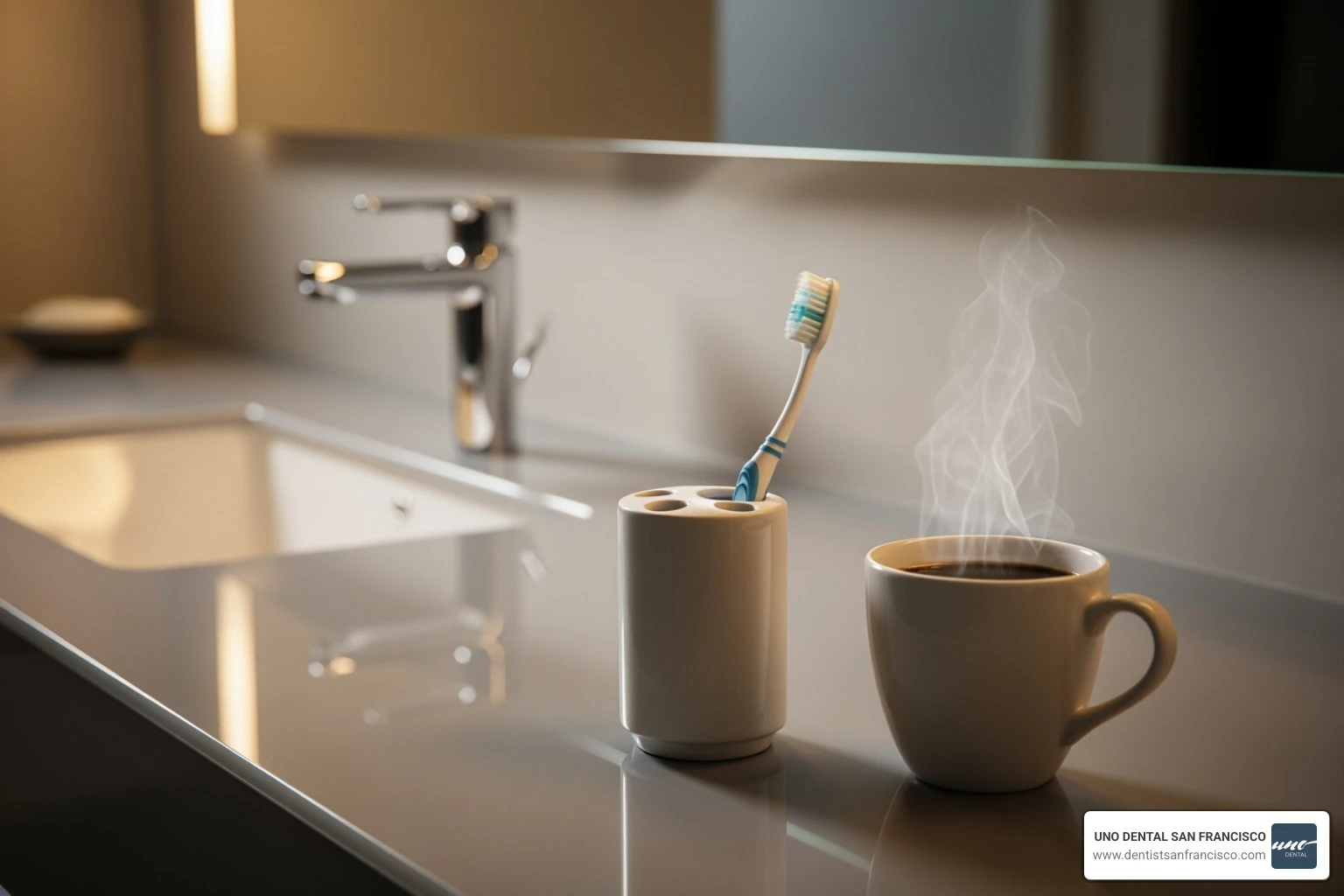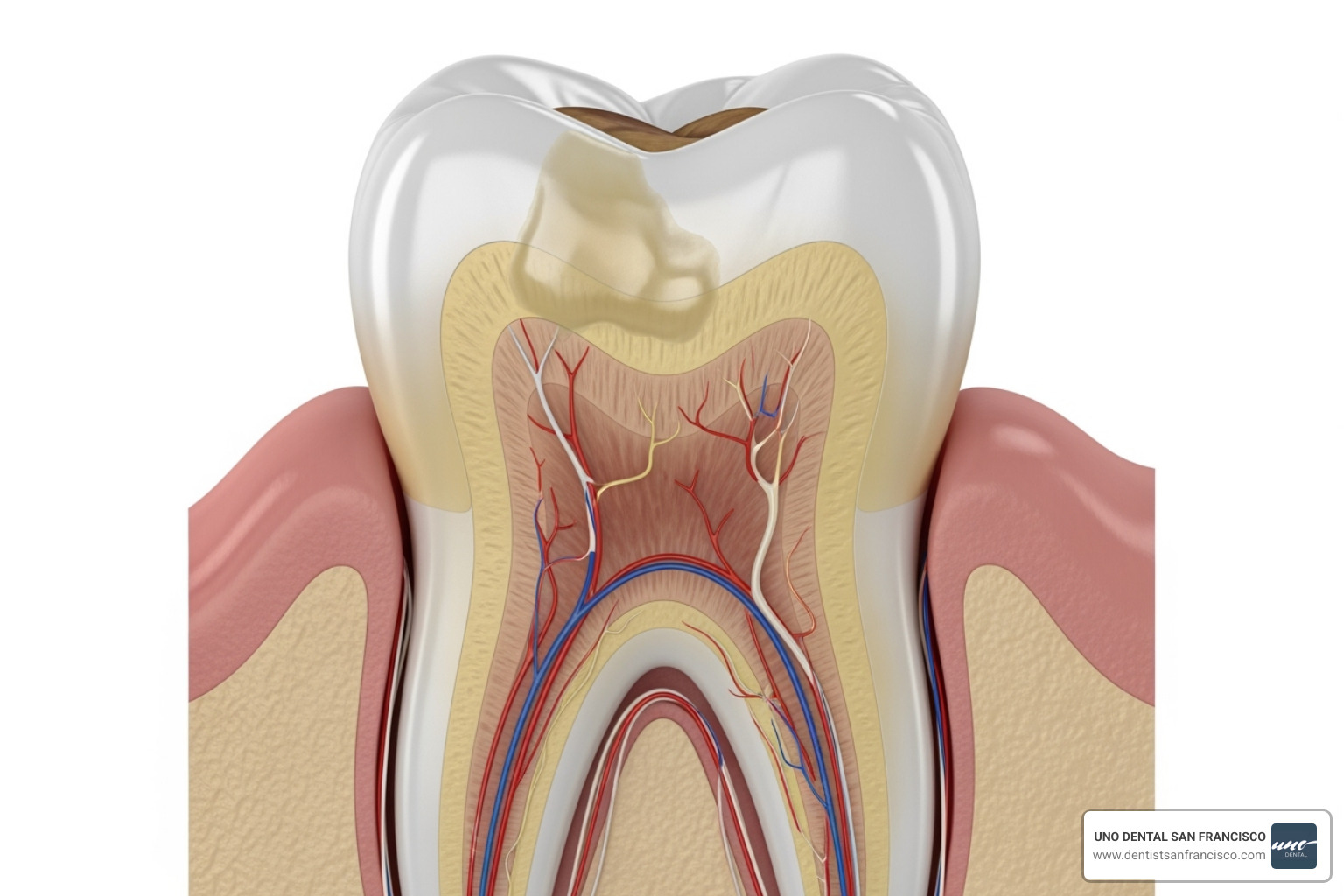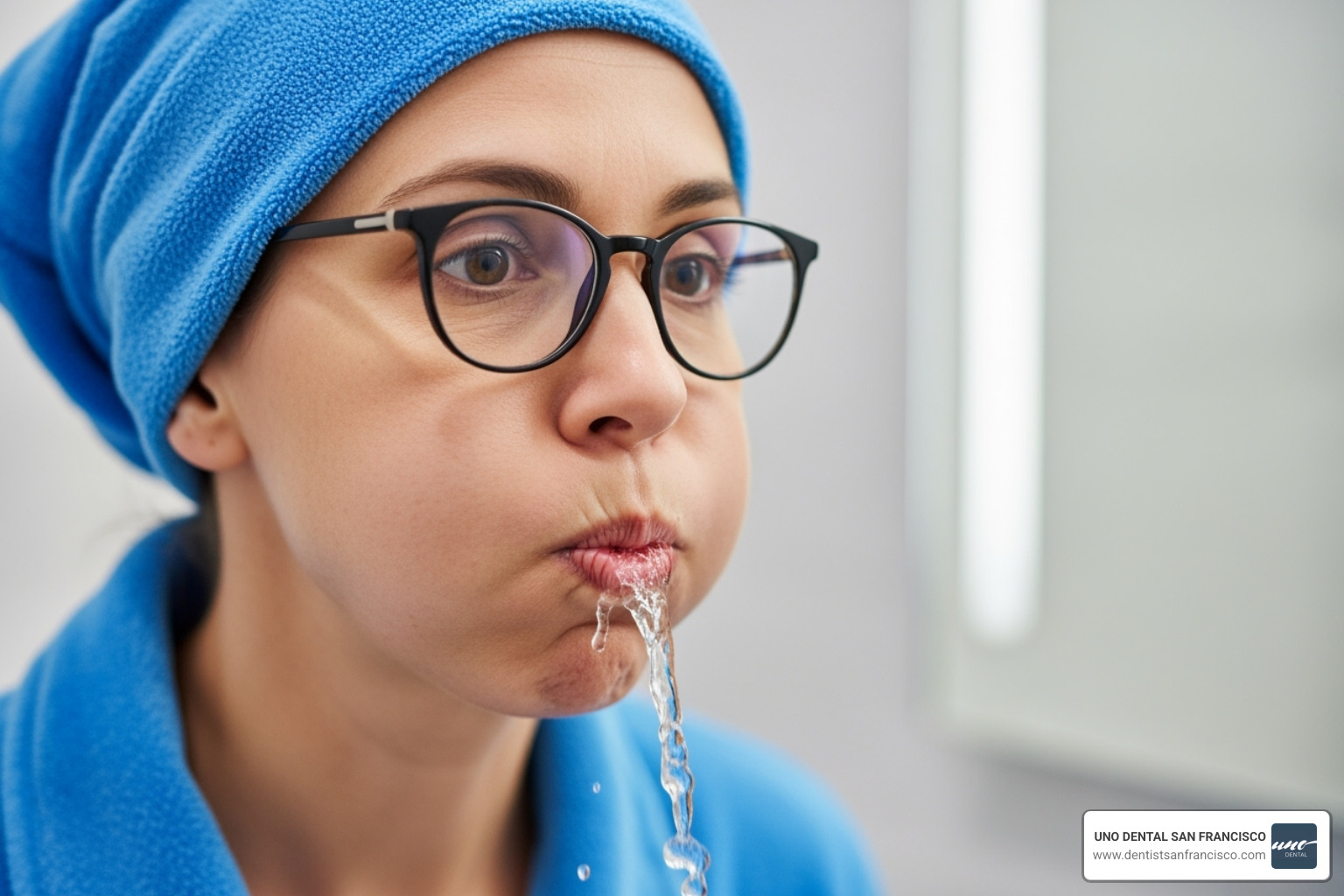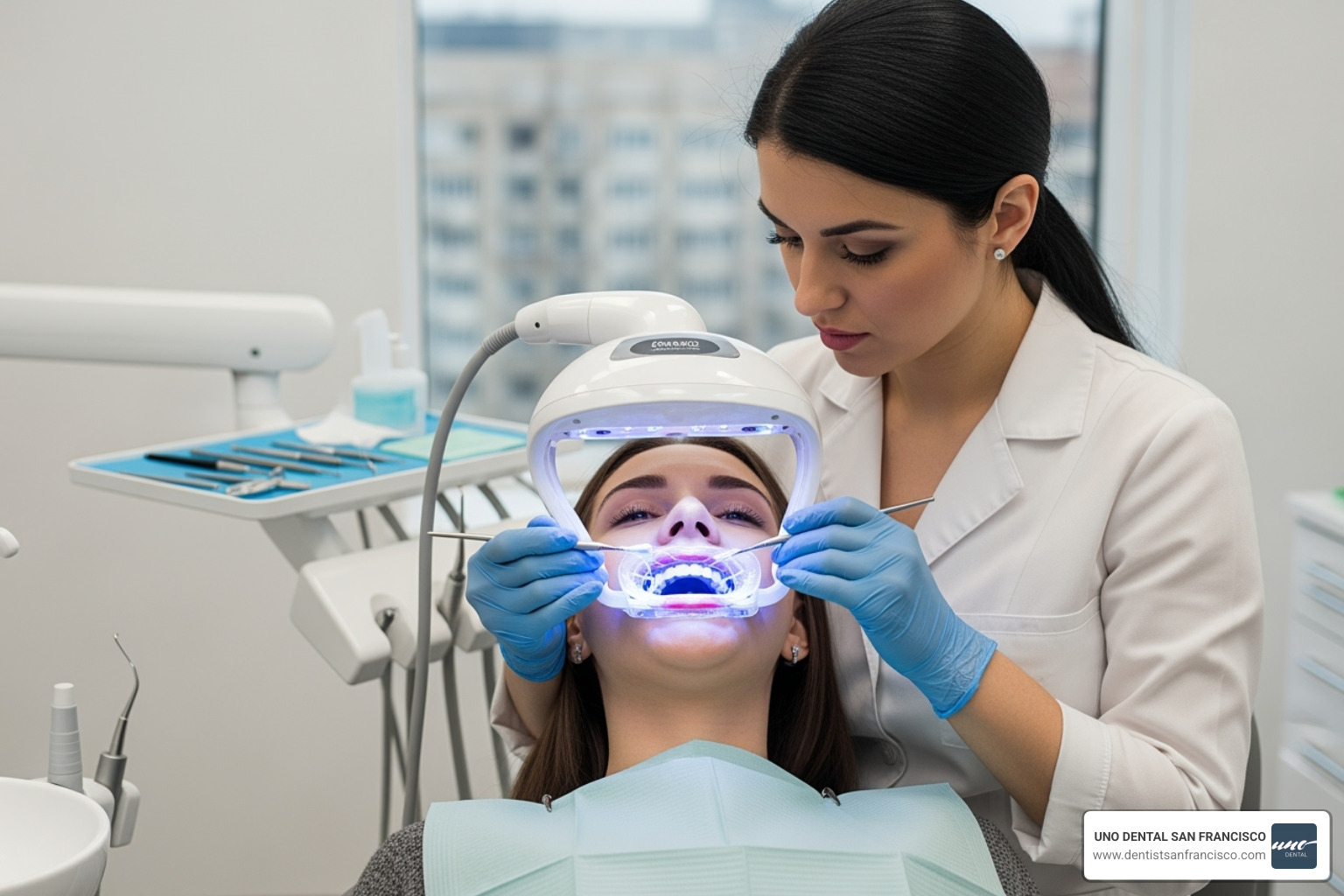
Why Your Morning Coffee Routine Needs Perfect Timing
Brushing teeth after drinking coffee requires careful timing to protect your tooth enamel from permanent damage. Here's what you need to know:
The Quick Answer:
- Wait 30-60 minutes after drinking coffee before brushing
- Coffee's acidity softens tooth enamel for up to an hour
- Brushing immediately can cause micro-abrasions and enamel wear
- Better option: Brush before coffee, then rinse with water afterward
- If you must brush after, rinse with water first and wait
That first sip of coffee is a daily ritual for many. But if you head straight to the bathroom to brush your teeth afterward, you might be doing more harm than good.
Coffee is acidic, and that acidity temporarily softens your tooth enamel—the protective outer layer of your teeth. When you brush immediately after drinking coffee, you risk scrubbing away tiny particles of softened enamel. Done habitually, this can lead to chronic enamel wear, increased sensitivity, and permanent damage.
The good news? Timing is everything. A simple adjustment to when you brush can protect your teeth while still letting you enjoy your daily cup of joe.
As Dr. Mohammad Aghiad Kandar DDS at UNO DENTAL San Francisco, I've seen countless patients struggle with coffee-related enamel damage from improper brushing teeth after drinking coffee timing. With over 15 years of experience in preventive and restorative dentistry, I've helped hundreds of coffee lovers protect their smiles through simple routine adjustments.
Find more about brushing teeth after drinking coffee:
Why Coffee and Your Toothbrush Shouldn't Meet Immediately
Your instinct after finishing coffee might be to brush immediately to freshen up. While well-intentioned, this can have unintended consequences for your teeth. Let's explore why your coffee and toothbrush need some time apart.
Coffee creates a perfect storm for your teeth. First, it's naturally acidic. Each sip gives your teeth an acid bath that temporarily weakens the protective enamel layer.
Second, coffee is loaded with tannins—dark, pigmented molecules that give coffee its rich color. Tannins stick to your tooth surfaces, settling into microscopic ridges and pores in your enamel, which is how stubborn coffee stains develop.
When you combine coffee's acidity with its staining power, you create a critical window where your teeth are vulnerable. The acid softens your enamel, making it more porous and easier for tannins to penetrate. If you brush during this period, you're not just cleaning—you're potentially scrubbing away softened bits of your protective enamel.
This creates micro-abrasions—tiny scratches that accumulate over time. While one instance won't destroy your smile, this daily habit can lead to chronic enamel wear, increased tooth sensitivity, and long-term enamel damage that's impossible to reverse.
The Science Behind Softened Enamel
Tooth enamel is the hardest substance in your body, but it's vulnerable to acid. When coffee hits your mouth, it lowers your oral pH level, triggering a process called demineralization. The acid pulls minerals from your enamel, leaving it temporarily soft.
Fortunately, your body has a built-in defense system: saliva. Your saliva works to neutralize the acid and restore lost minerals through a neutralization process. However, this repair work takes time.
Your enamel remains in this vulnerable state for about 30 to 60 minutes after you finish your coffee. During this window, brushing can literally brush away the softened enamel particles before your saliva has a chance to reharden them.
Long-Term Consequences of Brushing Softened Enamel
Enamel doesn't regenerate, so once it's gone, it's gone forever. This makes the long-term consequences of improper brushing timing particularly serious.
Chronic enamel wear is the most significant concern. Each time you brush softened enamel, you remove microscopic amounts of this protective layer. Over months and years, this adds up to noticeable damage.
As your enamel thins, the yellowish dentin underneath begins to show through, causing yellowing teeth that whitening toothpaste can't fix. This is a structural change, not a surface stain.
The dentin layer contains tiny tubules that connect to your tooth's nerve. When enamel erosion exposes these tubules, you'll experience increased sensitivity to hot, cold, and sweet foods.
Perhaps most concerning is the increased risk of cavities. Enamel is your first line of defense against decay-causing bacteria. When it's compromised, bacteria have easier access to the softer parts of your teeth, leading to permanent damage that requires professional intervention.
For comprehensive strategies to maintain strong, healthy teeth, check out our Tips for Healthy Teeth.
The Great Debate: Brushing Before vs. After Coffee
The question of whether to brush before or after coffee is a common morning dilemma. While there are arguments for both, dental experts increasingly recommend one approach for optimal oral health: brushing before coffee.
| Feature | Brushing Before Coffee | Brushing After Coffee (Immediately) |
|---|---|---|
| Enamel Protection | Removes overnight plaque and provides a fluoride coating, protecting enamel from coffee's acidity. | Coffee's acidity softens enamel, making it vulnerable. Brushing immediately can erode this softened enamel. |
| Stain Prevention | Creates a smooth, clean surface, making it harder for coffee pigments to adhere to your teeth. | Aims to remove fresh stains, but risks damaging enamel. If done habitually, can lead to chronic wear. |
| Plaque Removal | Effectively removes plaque and bacteria that accumulate overnight. | May remove some plaque, but the primary concern becomes enamel damage. |
| Fluoride Benefit | Allows fluoride from toothpaste to strengthen enamel and create a protective barrier before acid exposure. | Fluoride still beneficial, but less effective at preventing initial acid attack if enamel is already softened. |
| Taste Experience | Some people find coffee tastes "minty" after brushing, but if you wait 15 minutes, this effect can be minimized. | No immediate taste interference, but you might experience coffee breath for longer. |
| Dental Consensus | Generally recommended by dental experts as the safer and more protective option. | Advised against due to the risk of enamel erosion; if done, a significant waiting period (30-60 minutes) is crucial. |
| Long-Term Impact | Reduces long-term risk of enamel erosion and sensitivity. | Increases long-term risk of chronic enamel wear, dentin exposure, and sensitivity. |
The Case for Brushing Before Coffee
Brushing before coffee prepares your teeth for the acidic environment. Overnight, bacteria multiply and form a sticky film called plaque. Brushing first thing removes this buildup. This matters because coffee's dark pigments love to cling to plaque, creating stubborn stains.
A clean tooth surface is your secret weapon against stains. It's much harder for coffee's tannins to find a place to settle and cause discoloration.
Most toothpastes contain fluoride, which acts like a protective shield for your enamel. When you brush before coffee, you're coating your teeth with this strengthening agent right before they need it most. The brushing action also gets your saliva flowing, which is your body's built-in acid neutralizer.
Worried about a minty coffee taste? Simply wait about 15 minutes after brushing before taking your first sip. This brief pause allows the toothpaste flavor to fade while keeping all the protective benefits.
The Argument for Brushing After Coffee
The appeal of brushing teeth after drinking coffee is understandable: it removes residue and freshens breath. The logic is to remove staining agents before they settle. You'll get that fresh, clean feeling that makes you ready to face the world.
However, there's a significant catch. If you brush immediately after coffee, you're essentially taking sandpaper to softened enamel. Coffee's acidity has temporarily weakened your tooth's protective layer, making it vulnerable to the abrasive action of your toothbrush.
The waiting period isn't just a suggestion—it's essential for protecting your enamel. During the 30-60 minutes after coffee, your saliva is working to neutralize the acid and reharden your enamel. Interrupting this natural process risks causing permanent damage.
This is why most dental professionals, myself included, lean toward the "brush before" approach. It's simply safer and more protective of your long-term oral health. For more comprehensive guidance on maintaining excellent oral hygiene habits, check out our Best Dental Hygiene Practices.
The Best Practice for Brushing Teeth After Drinking Coffee
If you've decided that brushing teeth after drinking coffee works better for your routine, there's a golden rule you must follow: patience. The key to protecting your enamel while enjoying a post-coffee fresh mouth is to wait.
This waiting period gives your mouth's natural defense system time to work. Your saliva neutralizes coffee's acidity and helps your enamel recover from its temporarily softened state. Rushing the process is like touching wet paint—you'll damage the surface.
Dental experts recommend waiting at least 60 minutes after eating or drinking before brushing your teeth. This applies directly to your morning coffee. Respecting this timing allows your enamel to return to its natural hardened state, making it resistant to your toothbrush's bristles. This waiting period is crucial for the remineralization process, where saliva helps rebuild and strengthen your enamel.
How Long Should You Wait Before Brushing Teeth After Drinking Coffee?
The magic number for brushing teeth after drinking coffee safely is 30 to 60 minutes. Most dental experts lean toward the full 60-minute recommendation.
During this time, your mouth is in recovery mode. The acidity from your coffee has temporarily weakened your enamel. As one dental expert explains, "Whenever you eat or drink something acidic, including coffee, it leaves your enamel vulnerable for about 30 to 60 minutes until your saliva neutralizes the acidity and the pH in your mouth returns to normal."
This isn't just about acid neutralization—it's about allowing your teeth's natural repair process to complete. Your saliva contains minerals like calcium and phosphate that help reharden your enamel. Interrupting this process by brushing too early can cause more harm than good. Once you've waited, your enamel is back to its normal strength and ready for brushing.
If you're concerned about your enamel health, our team at UNO DENTAL San Francisco can help. Connect with our General Dentist San Francisco for expert advice.
What to Do While You Wait
Waiting 30-60 minutes can feel long, but you don't have to endure coffee breath. There are effective strategies to use while you wait.
Rinsing with water is your most powerful first move. A vigorous swish with plain water right after finishing your coffee helps wash away residue and begins neutralizing acid.
Chewing sugar-free gum containing xylitol is another fantastic option. It stimulates saliva production, speeding up the natural neutralization process, while xylitol helps prevent bacteria buildup.
If coffee breath is your main concern, look for zinc-based solutions. Coffee contains sulfur compounds that create its distinctive breath, and zinc is effective at neutralizing them. You can use a zinc-infused oral spray for immediate freshening or use zinc toothpaste after your waiting period is up.
Pro Tips for Coffee Lovers to Maintain a Bright Smile
You don't have to choose between your favorite brew and a brilliant smile. Beyond mastering the timing of brushing teeth after drinking coffee, several smart strategies can help keep your teeth healthy and bright.
- Drink water alongside your coffee. Every sip of water acts as a mini-rinse, washing away coffee particles and helping neutralize acids.
- Use a straw for iced coffee. This helps the cold brew bypass your front teeth, which are most visible when you smile.
- Avoid sipping coffee for hours. Prolonged exposure is a major culprit for both staining and enamel damage. Try to finish your coffee within 20-30 minutes.
- Limit sugar and creamers. These additives feed the bacteria in your mouth, creating more acid that attacks your enamel and contributes to plaque buildup, which traps stains.
- Chew sugar-free gum with xylitol after your coffee. It stimulates saliva production, which naturally cleans and protects your teeth.
- Schedule regular dental cleanings. Professional cleanings remove stubborn stains and plaque buildup that your toothbrush can't reach.
If you're already dealing with noticeable coffee stains, our Coffee Stain Removal services can help restore your smile's natural brightness safely and effectively.
Smart Sipping Strategies
How you drink your coffee is as important as when you brush. Small changes in your sipping habits can dramatically reduce coffee's impact on your teeth.
Drinking water alongside coffee should become second nature. Alternating sips continuously rinses away acids and particles, giving your enamel less time to soften and stain.
Using a straw for iced coffee is your secret weapon against front tooth staining. For cold brews, iced lattes, and frappés, it's perfect for bypassing the highly visible front teeth.
Avoiding prolonged sipping is worth the effort. When you nurse coffee for hours, your teeth never get a break from the acid attack. Try to finish your coffee within 20-30 minutes to give your enamel recovery time.
Limiting sugar and creamers protects your teeth. Sugar feeds oral bacteria, which produce more enamel-eroding acid. If you must add something, consider sugar-free alternatives or a splash of milk.
For those dealing with existing coffee stains, our Teeth Whitening for Coffee Stains treatments can help you start fresh with a brighter smile.
Can Coffee Be Good for Your Teeth?
Here's a plot twist: coffee isn't entirely the villain. Black coffee, without any additives, may have some surprising benefits for your teeth.
A fascinating 2009 study on coffee's antibacterial effect found that pure black coffee helped prevent cavities due to its natural antibacterial properties. The magic lies in compounds called polyphenols—powerful antioxidants that can inhibit the growth of cavity-causing bacteria like Streptococcus mutans.
This doesn't mean you should drink coffee as a health supplement, but you can feel less guilty about your daily cup. The key is "black"—no sugar, cream, or flavored syrups. These additives negate any potential benefits and turn your coffee into a feast for harmful bacteria.
So while we still emphasize proper timing when brushing teeth after drinking coffee, it's reassuring to know your morning ritual isn't all bad news. The acidity and staining potential are real concerns, but there's a silver lining in that dark roast.
Frequently Asked Questions about Coffee and Oral Health
As a San Francisco dentist, I get asked the same questions over and over about coffee and its effects on teeth. Here are the most common concerns.
Does adding milk to coffee reduce staining?
Milk in coffee has a mixed effect. Milk contains casein protein, which can bind to the tannins that cause coffee stains, reducing their ability to stick to your enamel.
However, this benefit is small. Most people add sugar or sweetened creamers, and even plain milk contains natural sugars (lactose). These sugars feed oral bacteria, which produce enamel-harming acids.
The bottom line? Milk helps slightly with staining, but it doesn't neutralize coffee's acidity and can contribute to acid production if sugar is present. It's not a magic solution for protecting your teeth.
Can I just use mouthwash instead of brushing after coffee?
Using mouthwash instead of brushing after coffee seems like a quick fix, but it's not a substitute. Mouthwash can help with coffee breath by killing some bacteria and masking odors, but it can't remove the sticky coffee residue and plaque from your teeth. That requires the mechanical action of brushing.
Plain water is actually a better choice right after coffee. A good water rinse helps neutralize acids and washes away particles without the potential downsides of some mouthwashes, which can contain alcohol that dries out your mouth.
Think of mouthwash as a supportive tool, but it can't replace the essential work of brushing teeth after drinking coffee (with proper timing).
What if I forget and brush right after coffee once?
Don't worry if you occasionally forget and brush right after coffee. A single instance isn't going to cause lasting damage. Your teeth are resilient, and one slip-up will only cause a minor micro-abrasion.
The real concern is habitual practice. Consistently brushing softened enamel day after day leads to chronic enamel wear, increased sensitivity, and long-term problems. It's the pattern that becomes problematic.
Focus on building better long-term habits rather than stressing over occasional mistakes. Try setting a reminder for 30 minutes after your coffee or switch to brushing before your morning brew. Progress, not perfection, is the goal.
At UNO DENTAL San Francisco, we believe in empowering our patients with practical solutions. Your smile is resilient, and with the right approach, you can enjoy your coffee and maintain excellent oral health.
Protect Your Smile from Coffee Stains
Your morning coffee ritual doesn't have to be the enemy of a bright, healthy smile. The relationship between coffee and oral health comes down to one crucial factor: timing. Coffee's natural acidity temporarily softens your tooth enamel, creating a 30 to 60-minute window of vulnerability where brushing can cause damage.
Here are the key takeaways for brushing teeth after drinking coffee:
- The Safest Approach: Brush before your coffee. This removes plaque and creates a fluoride barrier to protect enamel from the acid attack.
- If You Brush After: Patience is essential. Wait at least 30 to 60 minutes to allow your saliva to neutralize the acid and reharden your enamel. Dental experts recommend a full 60-minute wait.
- While You Wait: Rinse your mouth with water to wash away residue. Chew sugar-free gum with xylitol to stimulate saliva, your mouth's natural defense.
- Smart Sipping Habits: Drink water alongside coffee, use a straw for iced drinks, and avoid sipping for hours to minimize acid exposure.
- Drink It Black: Black coffee has some antibacterial benefits. Adding sugar or cream negates these and feeds acid-producing bacteria.
Don't stress about occasional slip-ups. The real concern is making immediate brushing a daily habit, which can lead to chronic enamel wear. Consistent oral hygiene, combined with these coffee-smart strategies and regular professional cleanings, will keep your smile bright and healthy.
At UNO DENTAL San Francisco, we understand that life's simple pleasures shouldn't come at the cost of your smile. Our comprehensive approach to dental care includes advanced solutions for coffee stains and enamel protection.
Whether you're dealing with existing coffee stains or want to prevent future damage, we're here to help you maintain a confident, radiant smile. Explore professional teeth whitening options that can safely restore your teeth's natural brightness, or schedule a consultation to create your personalized oral care plan.
Your coffee habit and a beautiful smile can coexist—you just need the right knowledge and professional support.




